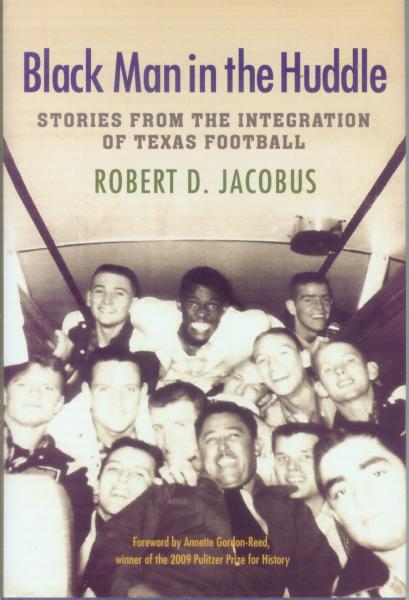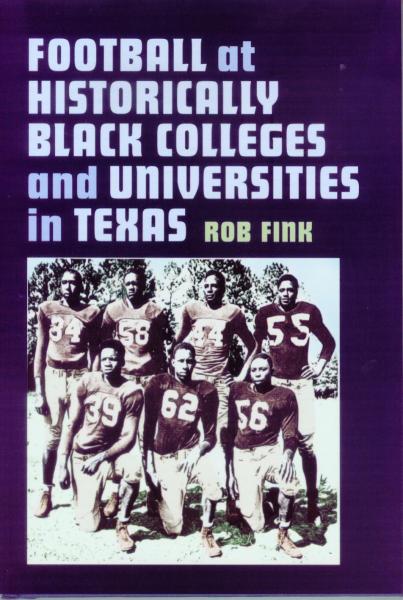
“By studying black college football in Texas, we gain a better understanding of the African American community in Texas, along with themes of civil rights, identity, racial pride, and cultural power.”
Two new books by Texas historians show how integration dramatically changed football in Texas.
Robert D. Jacobus, who teaches at Stephen F. Austin University, interviewed about 250 players and coaches for his book, Black Man in the Huddle: Stories from the Integration of Texas Football (Texas A&M University Press, $29.95 hardcover).
Rob Fink of Abilene, who a few years ago wrote a book about Negro League baseball in Texas, takes a chronological and cultural approach to Football at Historically Black Colleges and Universities in Texas (Texas A&M, $35 hardcover).
Both authors will speak at the West Texas Book Festival in Abilene on October 5-6—Jacobus at 1:30 p.m. October 5 at the Abilene Convention Center, and Fink as part of the Local Author Showcase at 2 p.m. October 6 at the Abilene Public Library South Branch (Mall of Abilene).
 Jacobus tells about the African American players who were among the pioneers integrating Texas high school and college football fields, and he tracked down many of them for interviews about their experiences, as well as some of their white teammates.
Jacobus tells about the African American players who were among the pioneers integrating Texas high school and college football fields, and he tracked down many of them for interviews about their experiences, as well as some of their white teammates.
Ben Kelly of San Angelo was the first black football player at a previously white college when he suited up for San Angelo College (then a junior college) in 1953, the year before the Supreme Court’s historic decision on Brown vs. Board of Education which paved the way for integration in public education throughout the nation.
Several Catholic high schools in Texas fielded black players in 1954, and a few Texas public schools integrated their football programs as early as 1955. San Saba was one of them. William Storms made the team and tells his story in the book. The team won just one game on the field that season but won another one off the field when Rockdale refused to play an integrated team and had to forfeit.
The same thing happened at Robstown in South Texas. The Cotton Pickers had several black players in the lineup for their 1955 season opener against Yoakum, but the Yoakum school board voted 7-0 to forfeit the game because Robstown was integrated, and Yoakum wasn’t.
Cisco Junior College integrated its team in 1956 with five black players from Abilene’s Woodson High School, including fullback Louis Kelley, who would go on to become a high school coaching legend in Lubbock, named that city’s “Coach of the Century” by the Lubbock newspaper in 2000. Jacobus interviewed Kelley four times while working on the book.
The same year North Texas State College became the first four-year college in Texas or the South to include black players. Abner Haynes and Leon King took the field with the North Texas freshman team for the first time on September 20, 1956, at Hardin-Simmons University in Abilene.

Rob Fink’s book traces the history of black college football in Texas through eight stages, beginning with Wiley College fielding a team in 1901.
The historically black colleges and universities like Prairie View A&M, Texas Southern, Paul Quinn, and others developed strong programs playing other black schools and enjoyed intense fan support from the black community in the 1940s and ’50s. Prairie View won five black college national championships in the ’50s and ’60s.
But as the formerly white colleges integrated their football teams, the predominantly black university programs declined. Prairie View suffered a nine-year drought, an eighty-game winless streak from, 1989 to 1998. The Panthers eventually rebuilt, winning their conference in 2009.
“By studying black college football in Texas,” Fink writes, “we gain a better understanding of the African American community in Texas, along with themes of civil rights, identity, racial pride, and cultural power.”
Glenn Dromgoole writes about Texas books and authors. Contact him at g.dromgoole@suddenlink.net.
